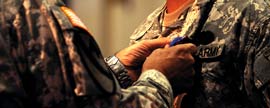Toxic Leadership is an issue that is getting leaders in a lot of trouble these days. While the 1SG’s actions are not appropriate, Top is a human being and we have all lost our tempers at some point in time. That does not make it right, but mistakes make us human.
Take Action
When you find yourself walking into a room with an irate or abusive leader, I recommend you take the following steps:
- Identify that you do not appreciate unprofessional and abusive language and intimidation. Politely ask him to stop. If it continues, shut up and deal with the issue later.
- Write a formal MFR stating what happened, when it happened, how it happened, and who witnessed it. Ensure it is factual, unemotional, and professional.
- Attempt to resolve the issue with the offender at a later date. You may have more success talking to him once he has had a chance to cool off.
- If you cannot resolve the problem with the 1SG directly, request a meeting with the Commander on open door policy.
Depending on the specifics of the situation, this could be considered Abuse of Subordinates. No command will or should tolerate abusive or toxic behavior. Senior leaders have a responsibility to deal with this. They are going to ask questions such as “how often does this occur” and “does it impact numerous individuals.”
AR 600-20 paragraph 1-5:
Commanders and other leaders committed to the professional Army ethic promote a positive environment. If leaders show loyalty to their Soldiers, the Army, and the nation, they earn the loyalty of their Soldiers. If leaders consider their Soldiers’ needs and care for their Well-being, and if they demonstrate genuine concern, these leaders build a positive command climate.
(4) Professionally competent leaders will develop respect for their authority by— (a) Striving to develop, maintain, and use the full range of human potential in their organization. This potential is a critical factor in ensuring that the organization is capable of accomplishing its mission. (b) Giving troops constructive information on the need for and purpose of military discipline.
(d) Requirement of Exemplary Conduct (Section 3583, Title 10, United States Code (10 USC 3583)). All commanding officers and others in authority in the Army are required— 1. To show in themselves a good example of virtue, honor, patriotism, and subordination. 2. To be vigilant in inspecting the conduct of all persons who are placed under their command. 3. To guard against and suppress all dissolute and immoral practices, and to correct, according to the laws and regulations of the Army, all persons who are guilty of them. 4. To take all necessary and proper measures, under the laws, regulations, and customs of the Army. 5. To promote and safeguard the morale, the physical Well-being, and the general welfare of the officers and enlisted persons under their command or charge.
2–2. Open door policies Commanders will establish an open door policy within their commands. Soldiers are responsible to ensure that the commander is made aware of problems that affect discipline, morale, and mission effectiveness; and an open door policy allows members of the command to present facts, concerns, and problems of a personal or professional nature or other issues that the Soldier has been unable to resolve. The timing, conduct, and specific procedures of the open door policy are determined by the commander. He or she is responsible for ensuring that Soldiers are aware of the command’s open door policy.
4–6. Exercising military authority a. Military authority is exercised promptly, firmly, courteously and fairly. Commanders should consider administrative corrective measures before deciding to impose nonjudicial punishment.
Meeting with the commander
When seeing the commander, present a memorandum for the commander explaining what happened initially and what happened when the Soldier tried to resolve the issue with the 1SG. Then request the commander take action to resolve the issue. If the commander fails to take appropriate action, take it to the Battalion leadership or consider an Article 138 complaint (redress against a commander).
Now just because regulation gives you the ability to do or request something does not mean it is the best method. It is quite possible to cause yourself more pain by being reckless in your approach to solving this issue. It is very important that you act logically and not emotionally.
As with most problems in the Army, the best way to handle this is at the lowest possible level of resolution. Everyone saves face and the issue is resolved. When that does not work, make sure you have your facts together, determine if it is worth the fight, and then move forward from there.
Looking to the future
If the 1SG was wrong, he will hopefully apologize and disengage. This should help Top grow and learn from the event. The NCO should keep his mouth shut about the issue–it should be resolved. If it occurs again he can take it back to the commander. If the 1SG becomes explosive, wait until the butt chewing is over and request to see the commander on open door policy.
No one wants to be mistreated but unfortunately many of us mistreat people at some point in our lives. We are all human. Give Top and the Commander a chance to fix the issue and do not let bullies dictate how you act.















Comments
SGT NICK
This happens a lot and is always bad to challenge the 1GT because one day you will mess up and the 1GT will be their to burn you instead of taking up for you. That happens too, once your on the 1GT Sh#t list, it gets bad. Most likely Top will only get reprimanded but that NCO will be going down hard if they ever make a mistake under the same command, and since they are a junior NCO they WILL make a mistake it is only a matter time. So you see the dilemma.